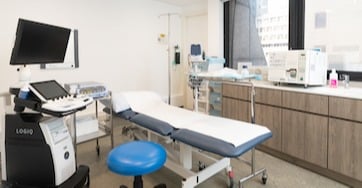Menopause (更年期, 停經) is a natural part of ageing but is often considered a taboo subject. Not many women are willing to talk about it openly, knowing what to do or where to seek help. Several women deal with menopause in silence, believing they must "live with it".
To shed some light on this topic, we cover the most common questions about menopause in this blog.
What is Menopause?
Menopause is when a woman stops having periods and can no longer get pregnant naturally.¹ It is diagnosed after you have gone 12 months without a menstrual period.² When a woman reaches the age of 45 to 55, her ovaries produce less oestrogen and progesterone, which will affect the monthly thickening, sloughing and discharge of the endometrium. Menstruation will become irregular in timing and account.³
Menopause is a natural biological process. Physical and emotional symptoms such as hot flashes (hot flushes) may lower energy, disrupt sleep, or affect emotional health.² Menopause can also cause weight gain. For most women, medical treatment is not needed for menopause.⁴
Men experience menopause too. To know more about “male menopause”, read here.
At What Age Does Menopause Begin?
Menopause can occur between 45 and 55 years of age. Most women first begin developing menopause symptoms about four years before their last period. Symptoms often continue until about four years after a woman’s last period. In Hong Kong, the average age of menopause recorded is 51.⁵
Natural menopause, which happens without medical intervention, occurs in three stages:⁶
- Perimenopause
- Menopause
- Postmenopause
During perimenopause, menstrual periods become irregular. You may completely skip one or more periods or may be late. Menstrual flow may also become lighter or heavier. Menopause is defined as the lack of menstruation for one full year. Postmenopause refers to the years after menopause has occurred, a phase that lasts for the rest of a woman’s life.⁴
What Are The Symptoms of Menopause?
Symptoms of menopause usually start a few months or years before your period stops, during perimenopause. It can also persist for some time afterwards. On average, most symptoms last around 4 years from your last period.⁷ Symptoms include:⁸
- A change in periods – longer or shorter, heavier or lighter, with more or less time in between
- Hot flashes (also known as hot flushes) – sudden, short feelings of heat, usually in the face, neck and chest, which can make your skin sweaty and red
- Night sweats – hot flashes that occur at night
- Difficulty sleeping – making you feel tired and irritable during the day
- Vaginal dryness
- Mood swings
- Trouble focusing
- Head hair loss
Menopause can also increase your risk of developing some other issues such as weak bones (osteoporosis).⁷ Talk to your doctor about how to best manage menopause.
How Long Do Menopause Symptoms Last?
Perimenopausal symptoms can last four years on average. The symptoms associated with perimenopause will gradually ease during menopausal and postmenopausal stages. Hot flashes are a common symptom of perimenopause.⁶ Research has found that moderate to severe hot flashes could continue past perimenopause and last for a median of 10.2 years.⁹
What Causes Menopause?
There are different causes of menopause, which includes:²
Naturally declining reproductive hormones
As you age, your ovaries will start producing less progesterone and oestrogen (hormones that regulate menstruation) and fertility declines. In your 40s, your menstrual periods may become longer or shorter, heavier or lighter, and more or less frequent until eventually, the ovaries stop releasing eggs and period stops.
Primary ovarian insufficiency
Around 1% of women experience menopause before 40 years old. This may result from the failure of your ovaries to produce normal levels or reproductive hormones known as primary ovarian insufficiency. This can stem from genetic factors or auto-immune diseases. For those affected, hormone therapy is typically used at least until the natural age of menopause to protect the brain, heart, and bone functions.
Oophorectomy (surgery that removes the ovaries)
As your ovaries produce hormones that regulate the menstrual cycle, surgery to remove your ovaries causes immediate menopause. Your period stops, and you are more likely to have hot flashes and experience other menopausal symptoms and signs. These can be severe, as hormonal changes occur abruptly rather than gradually over several years.
Hysterectomy (surgery that removes your uterus, and not ovaries) usually does not cause immediate menopause. Although you no longer experience periods, your ovaries produce oestrogen and progesterone and release eggs.
Chemotherapy and radiation therapy
Cancer therapies can induce menopause, causing menopausal symptoms during or shortly after the course of treatment. The stop of menstruation and fertility is not always permanent following chemotherapy as such, birth control measures should still be used. Radiation therapy only affects ovarian function if the radiation is directed at the ovaries. Radiation therapy to other parts of the body will not cause menopause.
Read the information here to know how menopause can be diagnosed.
What Are The Complications of Menopause?
Urinary incontinence
As the tissues of your urethra and vagina lose elasticity, you may experience strong, sudden, frequent urges to urinate, followed by the loss of urine with coughing, laughing, lifting or an involuntary loss of urine. You may also experience urinary tract infections more often.²
Osteoporosis
This condition causes the bones to become weak and brittle, leading to an increased risk of fractures. During the first few years after menopause, you may lose bone density at a rapid rate, increasing your risk of osteoporosis. Postmenopausal women with osteoporosis are especially susceptible to fractures of their spine, hips, and wrists.²
Cardiovascular disease
When your oestrogen levels decline, your risk of cardiovascular disease increases. Heart disease risk rises for everyone as they age, but for women, symptoms can become more evident after the onset of menopause. More than one in three female adults has some form of cardiovascular disease. An overall increase in heart attacks among women is seen about 10 years after menopause.¹⁰
Weight gain
Many women gain weight during the menopausal transition and after menopause because metabolism slows.²
Sexual function
Vaginal dryness from decreased moisture production and loss of elasticity can cause discomfort and slight bleeding during sexual intercourse. Also, decreased sensation may reduce your desire for sexual activity.²
What Are The Treatments For Menopause Symptoms?
Lifestyle and home remedies
Many of the symptoms and signs associated with menopause are temporary. Steps can be taken to help reduce or prevent their effects:²
- Cool hot flashes: Dress in layers, have a cold glass of water or go somewhere cooler. Try to pinpoint what triggers your hot flashes;
- Decrease vaginal discomfort: Try an over-the-counter silicone-based lubricant or moisturizer or a water-based vaginal lubricant. Staying sexually active can also help with vaginal discomfort by increasing blood flow to the vagina;
- Practice relaxation techniques: Techniques such as deep breathing, paced breathing, guided imagery, massage and progressive muscle relaxation may help with menopausal symptoms;
- Get enough sleep: avoid caffeine and drinking too much alcohol. Exercise during the day;
- Strengthen your pelvic floor: pelvic floor muscle exercises can improve some forms of urinary incontinence;
- Do not smoke: smoking increases your risk of heart disease, stroke, osteoporosis, cancer, and a range of other health problems;
- Eat a balanced diet: include a variety of fruits, vegetables, and whole grains. Try to limit saturated fats, oils and sugars.
Medical Treatments
Menopause does not require any medical treatment. Treatment focuses on relieving your signs and symptoms and preventing or managing chronic conditions that may occur with ageing. These treatments include:²
- Hormone Replacement Therapy (HRT): Oestrogen therapy is the most effective treatment option for relieving menopausal hot flashes. It helps prevent bone loss, but long-term use of hormone therapy may have some cardiovascular and breast cancer risks;
- Low-dose antidepressants: Certain antidepressants such as Selective Serotonin Reuptake Inhibitors (SSRIs) may decrease menopausal hot flashes;
- Vaginal oestrogen: This treatment releases just a small amount of oestrogen, which is absorbed by the vaginal tissues. It can help relieve vaginal dryness, discomfort with intercourse and some urinary symptoms;
- Medications to prevent or treat osteoporosis: Several medications are available to help reduce the risk of fractures and reduce bone loss.
- Cognitive Behavioural Therapy (CBT): Recommended by the National Institute for Health and Care Excellence (NICE), CBT can help women alleviate mood or anxiety that arise as a result of menopause.¹¹ CBT is a form of talk therapy that helps develop practical ways of managing problems and provides new coping skills and valuable strategies. You can learn more about CBT and mental health services at MindWorX.
Before deciding on any treatment, talk to your doctor about your options and the risks and benefits involved.
Reference
- (2018). ‘Menopause’. NHS UK. 29 August. Available at: <https://www.nhs.uk/conditions/menopause/>
- Mayo Clinic Staff. ‘Menopause: Symptoms & Causes’. Mayo Clinic. Available at: <https://www.mayoclinic.org/diseases-conditions/menopause/symptoms-causes/syc-20353397>
- ‘Menopause’. The Family Planning Association of Hong Kong (FPAHK). Available at: <https://www.famplan.org.hk/en/health-info/menopause>
- Holly Ernst, PA-C. Jennifer Huizen. (2020). ‘Everything You Should Know About Menopause’. Healthline. 13 January. Available at: <https://www.healthline.com/health/menopause>
- Family Health Service. (2013). 'When does menopause usually take place?'. Department of Health. April 2013. Available at: <https://www.fhs.gov.hk/english/health_info/faq/women_health/WH2_5_5.html>
- Debra Rose Wilson, Ph.D., MSN, R.N., IBCLC, AHN-BC, CHT. Annamarya Scaccia. (2019). ‘How Long Do Symptoms of Menopause Last?’. Healthline. 7 March. Available at: <https://www.healthline.com/health/menopause/how-long-does-menopause-last#_noHeaderPrefixedContent>
- ‘Menopause: Condition Information’. Eunice Kennedy Shriver National Institute of Child Health and Human Development (NIH.GOV). Available at: <https://www.nichd.nih.gov/health/topics/menopause/conditioninfo/default>
- ‘Menopause - Also Called Change of Life’. Medline Plus. Available at: <https://www.nichd.nih.gov/health/topics/menopause/conditioninfo/default>
- Ellen W. Freeman, PhD. Mary D. Sammel, ScD. Hui Lin, MS. Ziyue Liu, PhD. Clarisa R. Gracia, MD. (2012). ‘Duration of Menopausal Hot Flushes and Associated Risk Factors’. National Institute of Health (NIH). 1 May. Available at: <https://www.ncbi.nlm.nih.gov/pmc/articles/PMC3085137/>
- American Heart Association. ‘Menopause and Heart Disease’. Heart Org. Available at: <https://www.heart.org/en/health-topics/consumer-healthcare/what-is-cardiovascular-disease/menopause-and-heart-disease>
- National Institute for Health and Care Excellence. (2019). 'Menopause: diagnosis and management'. NICE Guidelines NG23. 05 December 2019. Available at: <https://www.nice.org.uk/guidance/ng23>

 Central General Practice
Central General Practice
 Repulse Bay
Repulse Bay
 Clearwater Bay
Clearwater Bay
 BodyWorX Clinic
BodyWorX Clinic
 Central Specialist Clinic
Central Specialist Clinic
 MindWorX Clinic
MindWorX Clinic
 Partner Clinics
Partner Clinics
 Family Clinic
Family Clinic
 OT&P Annerley Midwives Clinic
OT&P Annerley Midwives Clinic



